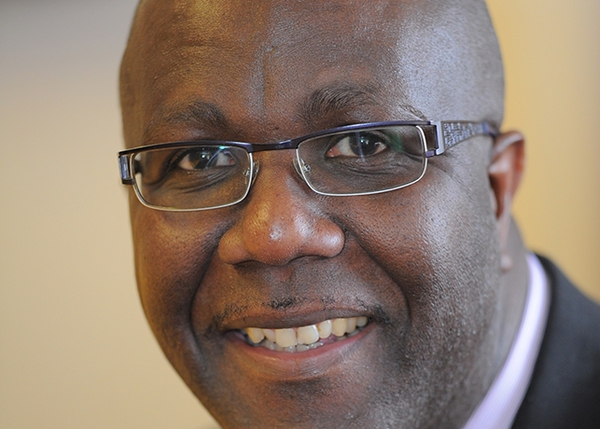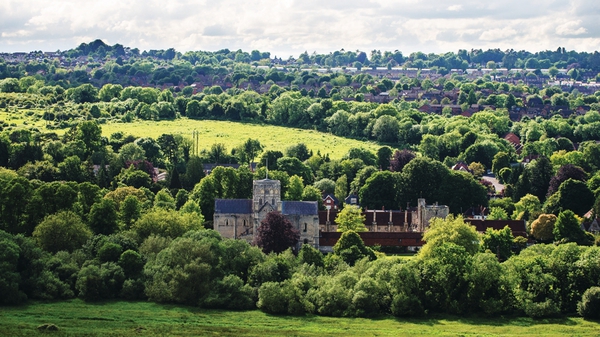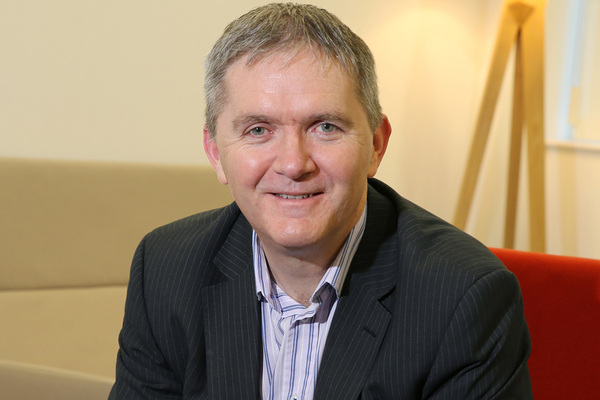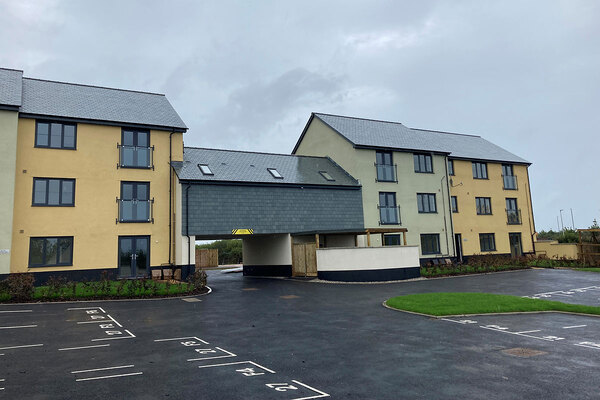You are viewing 1 of your 1 free articles
The strength of belief
The Church of England has been vocal in recent months about housing policy. Carl Brown meets ‘media bishop’ David Walker to find out more

Source: Guzelian
Bishop David Walker is in demand.
The Church of England’s unofficial housing spokesperson has limited time with Inside Housing ahead of speaking to the Manchester Evening News, The Observer and Radio 4. The 57-year-old is one of the Church of England’s (C of E’s) five ‘media bishops’ and is an old hand at speaking to the press. Even so, it has been an unusually busy period for Bishop Walker, as the church has been getting more and more vocal on his specialist areas: housing and welfare issues.
“Perhaps because I’d gone to arrange a funeral or Christening or something, and [we] ended up talking about overcrowding.”
In November the C of E’s general synod agreed a motion scathing of the bedroom tax, accusing the government of ‘almost a cultural disregard for the lives of the poor’. In March 2013, 27 bishops – including Bishop Walker – signed a letter condemning the government’s ‘punitive’ welfare reforms.
So why is the church stepping up to voice its housing concerns? And what it can it really add to the policy debate? Inside Housing went to visit Bishop Walker to understand more about the church’s role, and to find out what led the former National Housing Federation (NHF) board member to become interested in housing policy.
Source: Guzelian
‘What we bring to the conversation is a lack of self-interest,’ says Bishop Walker, chatting to Inside Housing’s news editor Carl Brown
Community spirit
We meet Bishop Walker in his official residence near Prestwich, looking out over north-west Manchester. He greets Inside Housing with a youthful bound, wearing sandals despite the freezing cold weather, dark trousers and a fleece top (which he later removes for the pictures in order to look more bishop-like).
We kick off by talking, in his book-lined living room, about the role of the C of E.
Bishop Walker, speaking in his soft Mancunian accent, believes the church has a role to play in housing for a number of reasons, not least because the clergy often have a close dialogue with people in need.
He says: ‘As a young vicar it was simply sitting in people’s homes, perhaps because I’d gone to arrange a funeral or Christening or something, and [we] ended up talking about overcrowding.’
In addition to this closeness to the community, Bishop Walker also believes the C of E has a strength in, unlike social landlords, being seen by policy-makers and the public as disinterested. ‘We are not developers, we are not builders, we are not people who are going to be getting rental income from the practices or policies we promote being more widely accepted,’ he points out. ‘What we bring to the conversation is a lack of self-interest.’
That may be so, but Bishop Walker also believes religious scripture helps the church inform its arguments. Not many housing professionals, for example, would cite passages from the Book of Leviticus when making an argument. Bishop Walker points to a passage in the book outlining 50-year leasehold tenancies, after which time ownership reverts to a property’s original owner, to ‘prevent the accrual of too much wealth’. He adds: ‘If it was important enough to set out housing legislation 3,000 years ago in a relatively simple society, maybe it is important to get these things right nowadays as well.’
The C of E’s involvement in housing issues is hardly new, the bishop points out - many housing associations around the country were founded by religious groups. However, he adds pointedly: ‘We tend to get involved when we feel there are issues that are not being adequately handled within the public sphere.’
So what issues does Bishop Walker feel are not being adequately handled by those currently in power?
“If your primary housing is in eastern Europe you can take a punt. Your safety net is not the UK benefits system”
The obvious one is the lack of housing supply, and the bishop’s main solution to this is the old chestnut of capital subsidy. He believes the government’s shift from capital to revenue subsidy has ‘solved short-term political problems but deepened the poverty trap. Unless you put money into capital subsidy you are not going to drive rents down,’ he says.
Driving rents down is a recurring theme. Bishop Walker says numbers of new homes are important, but not if they are unaffordable to live in. He also says a large proportion of Britain’s population ‘cannot and will not ever be able to entirely finance their own housing through the private sector market’, so social housing will always be needed.
But what about the argument that driving up numbers – which seems to be the argument of the National Housing Federation – is key, as increasing supply will lead to lower rent? Bishop Walker is doubtful about this because housing associations will have to rely on debt. ‘If social landlords are having to borrow most of what they need in order to build those properties on the financial markets, that creates a floor level the rents can’t drop below,’ he says.
While capital subsidy is Bishop Walker’s – and let’s face it, everybody in social housing’s - big ask, what else does the government need to do? For this bishop, the system for valuing land also needs to change to enable more land to be released for housing – but again this ‘requires serious intervention from the government.’
He acknowledges that the church itself can play a role here as it is one of the largest landholders in the country However he says: ‘The vast majority of [the church’s land] is in deeply rural areas that you would never get or even want to seek planning permission for.’
The housing crisis, then, is of immense concern to Bishop Walker, but it is the issue of welfare reform that seems to get him most heated.
He scathingly describes the bedroom tax as ‘insidious’ and wants it abolished, no ifs or buts. Part of the problem with it is that it is ‘pitched at the sort of level that means people struggle to try and afford it,’ the bishop says ruefully. ‘Most try to draw the purse strings a little bit tighter. And then slip slowly and steadily into debt.’
The sector’s view of Bishop Walker
’He has got one of the strongest social consciences I’ve come across. He has a very incisive mind and is a great listener.’ Tony Stacey, chief executive of South Yorkshire Housing Association
‘He is quietly understated but he has a high level of impact because he provides a timely reminder of what housing associations are in business for.’ Nick Atkin, chief executive of Halton Housing Trust
Plight of the poor
When it comes to the benefit system more generally, Bishop Walker believes people do not have confidence in the system, and says he has seen no evidence of a more responsive, faster system under universal credit, which has been introduced in parts of his Manchester diocese. He says the biggest disincentive to finding work is the fear that a change in circumstance - even one for the better - could lead to a revaluation of benefits. Interestingly, he links this to economic migration.
He says: ‘It is that lack of confidence and trust in the benefit system which makes much of the part-time, temporary work more attractive to people who have a got a home in another country, if your primary housing is in eastern Europe you can take a punt. Your safety net is not the UK benefits system.’
Bishop Walker’s solution to all of this is vague. He insists universal credit is worth sticking with, but stresses the importance of getting it right before rolling it out. For this church man, a slowing down of the universal credit timetable may be what’s needed.
Source: Guzelian
David Walker is one of the Church of England’s five ‘media bishops’. He says: ‘If it was important enough to set out housing legislation 3,000 years ago in a relatively simple society, maybe it is important to get these things right nowadays as well.’
Our conversation moves on to public attitudes to welfare recipients. Bishop Walker says attitudes have hardened, and he bemoans a ‘political rhetoric making distinctions between the deserving and undeserving poor’
The vast majority of claimants, he says, ‘are not scroungers’ and want to work, and it is unfair to punish as a result. ‘Part of the religious tradition, going back to the first book of the bible, is that it is better to let the occasional guilty person get away than punish the innocent,’ the bishop adds.
As we talk it is apparent that Bishop Walker is fiercely passionate about the plight of the poorest in society. So where does this come from?
Bishop Walker was aware of the benefits system from a relatively early age. At the age of 14 his father, a draughtsman and main breadwinner in the family, died of cancer. This left his mother bringing him up with a widow’s pension and other benefits, as well as income from a record shop she managed. He said it was ‘touch and go’ whether he could afford to stay in school long enough to complete his A-levels. Luckily, he did, and later went to Cambridge, where he read mathematics. He found God around the time he started going to university, after realising the stories of Jesus Christ ‘had the ring of truth to them.’
Realising that people seemed to want to talk to him, as a young man the bishop decided he was better suited to working in the church, so studied theology and entered the clergy.
A ‘pivotal’ moment for Bishop Walker came in the mid-1980s when he went to be a vicar in the mining town of Maltby, Yorkshire, following the miners’ strikes. British Coal was selling off workers’ houses in the town and residents feared their homes would be bought by an unscrupulous private landlord who would not carry out maintenance. ‘I kept picking up these stories of fear,’ he says.
Bishop Walker intervened and worked with South Yorkshire Housing Association (SYHA) on its board to help people. Bishop Walker later became the chair of SYHA, and then served on the board of the National Housing Federation. In keeping with his desire to learn, he opted to chair the NHF’s supported housing committee because it was the ‘thing he knew least about’.
Learned, with a strong social conscience, Bishop Walker has the potential to be a formidable advocate for the social housing sector.
As the church gears up ahead of the election, social housing sector figures will be hoping that the bishop can use his ‘disinterested’ position to get ministers and their shadows to listen.













